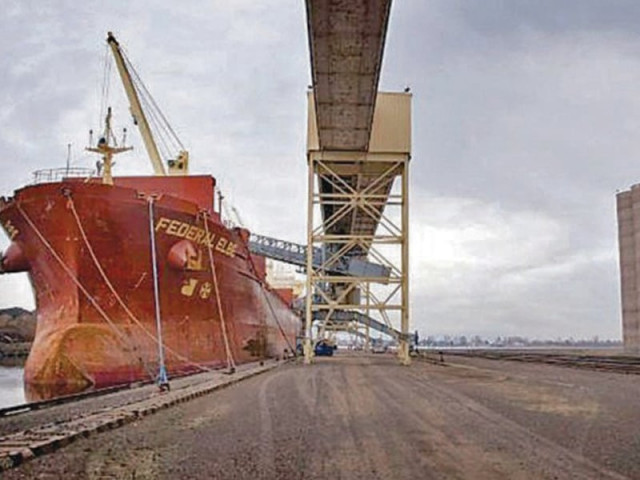Out of bread: Pakistan eyes largest wheat imports as supply dwindles
Purchases to climb to highest in five years after delayed planting and reduced fertiliser use hit domestic output.

Pakistan is likely to source the bulk of its supplies from the Black Sea due to lower prices and the country has already booked some 250,000 tons for arrival later this month. PHOTO: FILE
Pakistan is set to become a net wheat importer this year with purchases climbing to the highest in five years after delayed planting and reduced fertiliser use hit domestic output and drove up local prices.
Pakistan, which has been exporting wheat for the last three years, joins a growing list of countries that have seen production curbed, squeezing global supplies and buoying prices.
Pakistan is likely to ship in 800,000 tons to one million tons of wheat in the year to March 2014, traders said, the most since 2008-09 and way up from the 200,000 tons bought last year. Supply will mainly come from the Black Sea region due to competitive prices offered there.
“We have just finished the harvest and one would imagine that everything is alright but prices are moving higher,” said a Karachi-based grains trader.

“There is shortfall in the market as our production was well below the government’s target and there has been drawdown in stocks.”
Wheat production in Pakistan slid to 23.3 million tons in 2012-13, the lowest in four years and down from 25 million tons a year ago, according to the US Department of Agriculture. Output in 2013-14 is estimated at 24 million tons.
Shipments to iran unlikely
Traders said tighter domestic supplies would further jeopardise plans to export wheat to Iran under a one- million-ton barter deal agreed last year that has been stymied by wrangling over details.
“Shipments haven’t taken place since last year and it is even more unlikely now,” said another trader in Karachi. “They keep on talking about it but we don’t believe it will happen.”
A Pakistani food ministry official said the deal was “still being decided”. Food imports are not affected by Western sanctions on Iran.
As part of the broad scheme, Iran last month agreed to take wheat worth $9 million from Islamabad in exchange for settling part of payment owed by Pakistan for electricity supply.
Pakistan’s wheat output has been hit by delayed planting caused by late harvests of other crops such as cotton and sugarcane. Farmers usually finish wheat seeding by November but that stretched right up to January this year in some parts of the country, traders said.
Reduced fertiliser-usage due to rising prices has also hit crop yields.
The decline in Pakistan’s wheat production mirrors similar drops in top exporters and producers the United States, China, Russia and parts of Europe.
Although Pakistan’s estimated imports of 800,000 tons to 1 million tons are paltry in terms of global trade of 148 million tons, any additional demand for milling wheat will further strain global supplies.
China has been on a wheat buying spree after as much as 16% of its production was damaged by rains ahead of harvest. It is likely to surpass Egypt as the world’s top wheat importer.
Global wheat prices rose 2.4% in July on the Chicago Board of Trade even as corn and soybeans suffered deep losses on expectations of higher production.
Global wheat output is expected to rise this year from last, but will still be below demand, leaving the world with the lowest wheat stocks since 2008-09.
In Pakistan’s financial centre of Karachi, wheat prices have jumped to $340-$350 a ton from the around $300-$310 a ton typical at this time of year.
Pakistan is likely to source the bulk of its supplies from the Black Sea due to lower prices, traders said, adding that the country has already booked some 250,000 tons for arrival later this month.
Authorities in Pakistan are under pressure from the industry and state governments to abolish a 5% withholding tax on wheat imports which will bring down the cost of the imported grain.
The Economic Coordination Committee (ECC) is likely to take up the issue in the coming days, traders said.
“Prices in the domestic market are much higher than international prices,” said one Singapore-based trader who has been selling cargoes to Pakistan. “We think they will be active in the market for the next few months.”
Published in The Express Tribune, August 2nd, 2013.
Like Business on Facebook, follow @TribuneBiz on Twitter to stay informed and join in the conversation.



















COMMENTS
Comments are moderated and generally will be posted if they are on-topic and not abusive.
For more information, please see our Comments FAQ